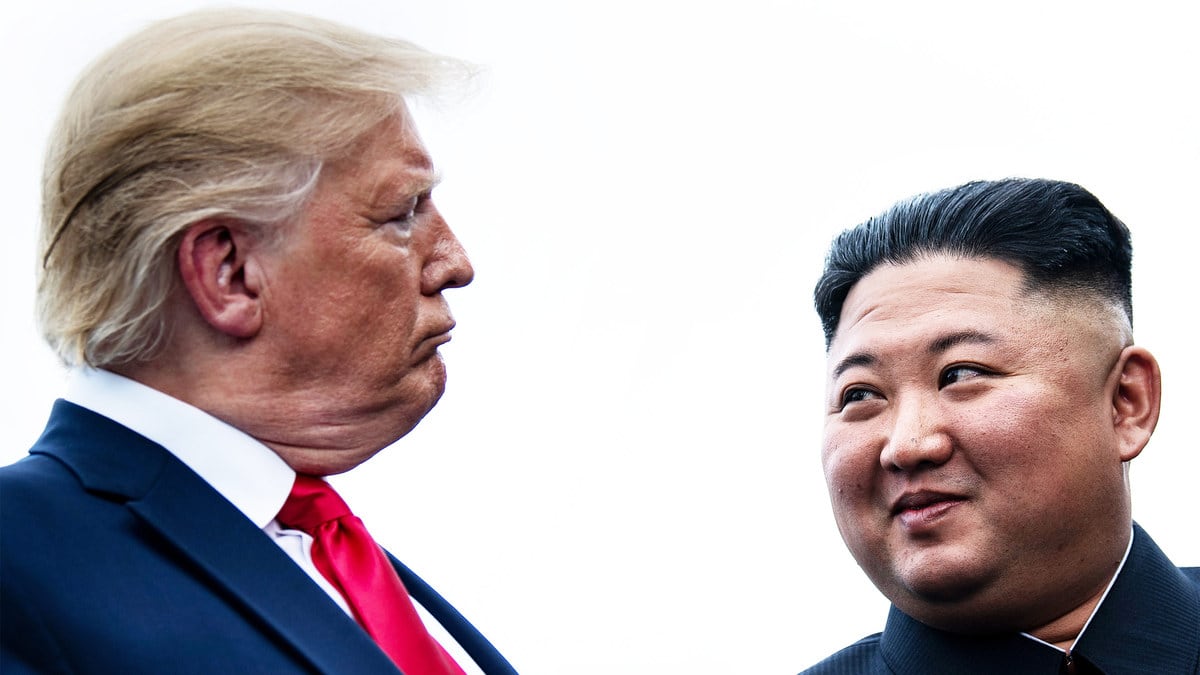SEOUL–The impeachment of President Donald Trump has come at a moment when his administration is getting nowhere in critical talks on the Korean Peninsula and there’s a growing risk Kim Jong Un will resume long-range missile tests by the end of the month.
So there’s palpable fear we’ll soon return to the days of “fire and fury,” rhetorically at least, as Trump, feeling cornered, will try to distract from his troubles by lashing out at North Korea or petulantly pulling American troops out of the South. Or both.
“Kim Jong Un had said he would give the USA a Christmas present,” says Michael Shim, a businessman. “What could that be–a long-range nuclear-tipped missile heading towards the United States?”
The concern is not that Kim would launch such an attack, but that he would prove once again that he has given up nothing and still has that intercontinental ballistic ability, which Trump has vowed he’ll never tolerate.
It doesn’t calm anyone’s nerves to learn that U.S. nuclear envoy Stephen Biegun, after failing to meet with the North Koreans, went to Beijing to ask China if it can please persuade Kim not to make good on his threats to return to nuclear-and-missile tests.
Vastly complicating matters, Trump also is embroiled in a long-running dispute with South Korea over how much Seoul should pay for U.S. bases and forces. He’s demanded South Korea fork over $5 billion, about five times as much as this year, but U.S. negotiator James DeHart has failed to get anywhere with the South Korean government of President Moon Jae-in.
The liberal Moon and the conservative Trump have shared common cause in their quest to come to terms with Kim, but the spirit of cooperation between Trump and Moon, like Trump’s professed “love” for Kim, may not endure.
Trump might return to the hardline policy of two years ago when he denounced Kim as “Rocket Man” and threatened the north with obliteration, and Pyongyang certainly is aware of that.
“North Korea is not necessarily happy,” says Choi Jin-wook, former president of the Korea Institute for National Unification. “It has been dependent on Trump's initiative to make a breakthrough. If Trump is weak or out, the U.S. policy toward North Korea will be even tougher.”
A former official with South Korea’s National Intelligence Service puts the North’s dilemma more bluntly. “Rocket Man worries that Trump feels so frustrated that he seeks a scapegoat,” he says. “As for Moon, he’s pathetic–already dead meat politically.”
Nevertheless, rising numbers of anti-American demonstrators are protesting U.S. demands for South Korea to pay more for the bases and demanding U.S. forces get out. At one gathering across the street from the U.S. embassy, about 200 people recently chanted “close the bases” and “go home” in Korean–a portent perhaps of much larger protests as talks on pay for the bases drag on.
Right-left tensions are heating up in the South even as Kim’s concerns in the North are driving him to resume intimidating tactics by testing the North’s latest devices capable of raining plenty of his own fire and fury on the southern half of the peninsula.
Pyongyang isn’t expected to conduct its seventh nuclear test–its sixth was in September 2017–right away. But another test of a long-range ballistic missile or the launch of a satellite employing missile technology does appear highly possible, and Trump previously has cited the fact Kim stopped those tests in 2017 as a triumph for his diplomacy.
“Reversible steps are being reversed, and North Korea is essentially ‘renuclearizing,’” says Vipin Narang at the Massachusetts Institute of Technology. Narang says the latest tests of launch facilities at the Sohae site near the Chinese border are “for the development of a new strategic system” even though the site had been “cosmetically dismantled as a “denuclearization step.’”
Kim will be looking for endorsement of whatever he’s got in mind at a meeting of the central committee of the ruling Workers’ Party set for next week just before the January 1 deadline he has set for the U.S. to come up with a new proposal for denuclearization, presumably including relief from sanctions and a “peace declaration” proclaiming an end to the Korean War.
“It is possible that Kim Jong Un is convinced the situation will not change,” Fyodor Tertitskiy, a senior researcher at Seoul’s Kookmin University, told NK News here, and he will “start passing instructions on how to adapt to this new reality”–i.e., that the U.S. will go on demanding denuclearization as a prerequisite for a deal
Nuke negoatiator Biegun, while in Seoul, made clear the U.S. would not agree to any deadline while it continued looking for talks. Rather, he said, “We have a goal to fulfill the commitments the two leaders made” at their summit in Singapore, where they signed a brief statement professing “unwavering commitment to complete denuclearization of the Korean peninsula.”
Trump declared at the time that the North Korea problem had been “solved.”
It’s “time for us to do our jobs,” said Biegun, addressing the North. “Let’s get this done. We are here, and you know how to reach us.”
While Biegun waits and Trump fumes, speculation is rife about a dramatic turn for the worst.








